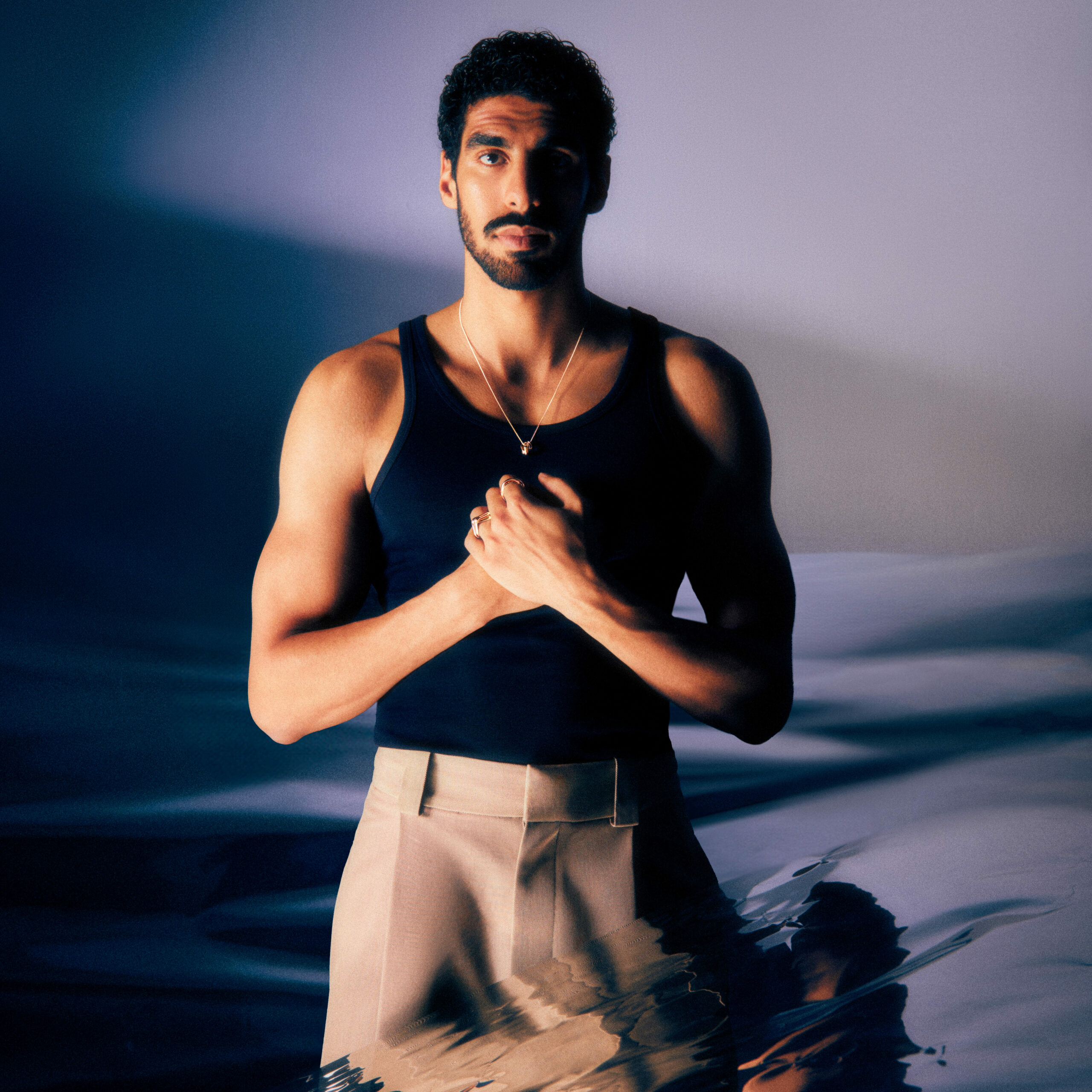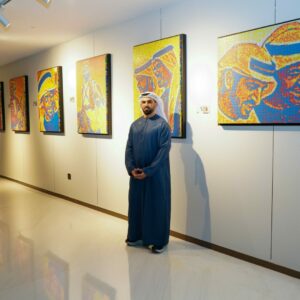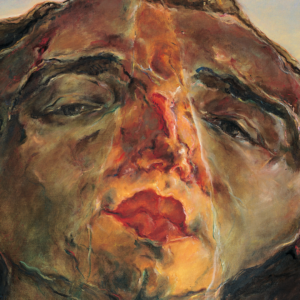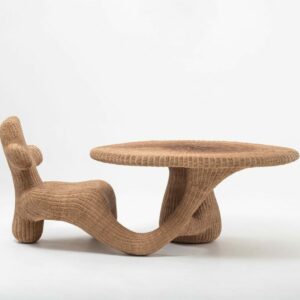Countless individuals would trade places with Abdelrahman Elaraby (Instagram) in a heartbeat—he’s the picture of success, youth, and charm, adorned with medals and accolades. The spotlight follows him effortlessly; his athletic prowess is undeniable. He’s popular, he’s endearing, and the path to even greater achievements stretches out before him, ready for the walking. Yet, he’s wrestling with an internal conflict: does he truly want it all?

In a candid moment, he peeled back the curtain on the complex reality of a professional athlete’s life. It’s not just about the glittering trophies and the roar of the crowd. It’s a constant battle against a maze of expectations, navigating the demands of federations and universities, all while under the crushing weight of needing to perform at your peak, every single time.
Speaking from his Garden City family home in Cairo over ZOOM, Haridi Sameh, also known as Abdelrahman El Araby, the outspoken Egyptian swimmer who doesn’t shy away from speaking his truth, be it about his uphill battle with mental wellness, his nagging self-doubts despite an impressive array of awards, or his relationship with God, initially presented a composed, almost stoic façade. It was a challenge to decipher the emotions behind his guarded expression. There was this wariness but also a subtle inquisitiveness layered behind his brooding eyes. Question after question, we began to chip away at these layers, and his true personality started to reveal itself, one laced with this charming, yet sometimes self-deprecating wit, all underpinned by this inexplicable desire for genuine human connection.


I was armed with a stock of questions dissecting everything related to swimming – his big wins, and his future plans to conquer the sporting world – but he instantly disarmed me, revealing that he just completed a Master’s of Non-Profit at Notre Dame and is actually going to be starting a corporate desk job soon. This was the same young man who had been a member of the Egyptian National Team, a Junior Olympic Bronze medalist, Egypt’s National Champion, a Mediterranean Games Silver medalist, a two-time All African Champion, and an NCAA Champion, among other things.
Despite his impressive track record and his recent surge in fame, he wasn’t willing to gamble everything on swimming. He explained that a stable corporate gig would ease the immense pressure of relying solely on swimming for his livelihood. In his words, “I would be stressed every day that if I don’t do well in this race, I won’t be able to eat for several months.” He paused, then added, “This would be a good motivation to have, but let’s bring this idea five minutes before the actual race. I don’t want this to be the whole thing I’m thinking about for like five or six months before my actual competition.”

It was clear he wasn’t interested in putting all his chips on the table when it came to swimming. Honestly, it caught me off guard – having read all about his incredible milestones and accomplishments prior to the interview – but it also made me lean in more, set aside my carefully-prepared questions, and just listen. He had a lot to unload.
“I love swimming,” Elaraby confesses, a hint of wistfulness in his voice, “but it does bring a lot of stress.” It was a relentless juggling act—qualifying times, strict schedules, championships clashing with academic commitments. “There’s a lot of other factors,” he sighs.
He recounted the trials and tribulations of his collegiate sports career. In 2018, after two consecutive years as Egypt’s top-ranked swimmer and a seventh-place finish in the 50m butterfly at the FINA World Junior Swimming Championships, he left Cairo for the American Midwest, snagging a full-ride scholarship from the University of Louisville, where he would spend the next five years in what he called a “very miniature city,” fighting to keep his passion for swimming alive while grappling the relentless pressure to perform that emanated from the underbelly of the U.S sporting system. There, he faced the daunting challenges presented by a new culture, a grueling training regimen, and a back injury that nearly sidelined him.

Struggling to balance academics with intense training, homesickness gnawed at him. He found it hard to adapt – the cold pools, the demanding workouts, the absence of his familiar coaches and his mother. “I was lonely,” he confessed. “I was the weird new kid from Egypt. I believe I’m different. I’m an acquired taste, I didn’t expect everyone to love me.”
He did things a bit differently, he swam against the grain, butting heads with coaches along the way. “I was just a kid that just came from Egypt. I had never swum more than 5,000 yards at practice. Suddenly, I found myself swimming 12,000 yards a day along with these pro, Olympic-qualifying swimmers. It was a lot,” he admits. “It was more than anyone in my family has ever walked in their life, probably,” he added jokingly.

The relentless grind eventually became too much. The rigid rules, the constant pressure to qualify, the near-misses at the Olympics – it all chipped away at his love for swimming, leaving him feeling trapped and disillusioned. A deep depression took hold, nearly culminating in a tragic, self-inflicted incident. It was a harrowing low point that shook him, and those around him, to the core.
But that close call reignited something within him. Less than a year after that dark moment, he was back on his feet, winning the 50-yard freestyle at the ACC Swimming Championship. Elaraby had been collecting accolades since he was 15, but this victory held a different significance. “Maybe for other people an ACC medal does not really matter much but it was not about the medal, it was what the medal represented,” he reflects.

The win was a lifeline, pulling him back from the brink. It marked a turning point, a shift in perspective. “I was really scared of falling back into the trap of swimming becoming everything in my life again,” he admits. Instead, he sought solace in exploring other dimensions of himself—a devoted brother, a loving son, a loyal friend, even a talented cook.
Beneath his words and gestures, there’s a subtle weariness, a hint of disillusionment, yet also a disarming humility. You feel his deep-seated need to be recognized as a person first, not just the sum of his accomplishments or the labels that have been plastered onto him. He is a man who has weathered many storms, who sees through the clout and popularity that comes with fame. He doesn’t want to indulge fully in the celebrity game, choosing instead to navigate his life with intention and purpose.
He doesn’t want to be reduced to the “iconic swimmer” or the “Arab legend”. He wants to connect. He wants to feel and inspire. He wants people to see him as Abdelrahman, the young man from Garden City, Cairo who unexpectedly found himself thrust onto a much larger stage. It’s not that he shies away from the responsibility, but he craves something more real, tangible, and human.

“I recently discovered that I hate the idea that people see me as just a swimmer,” Elaraby confesses. “I hate when people meet me and they’re not interested in getting to know me as a person. The conversations always revolve around the next move, the next Olympic win.”
In October of 2023, Elaraby experienced a massive-life shifting moment on a podium in Greece. He was in Athens for the World Aquatics Swimming World Cup. He had just snagged first place in the 50m Butterfly final. Instead of basking in the glory and riding the adrenaline high, he ushered in a sobering moment, pointing attention back to Gaza and his brothers and sisters in Palestine, giving a speech that would reverberate around the world, through sensationalist headlines, and a litany of interviews, all of which blistered through social media. This placed a major spotlight on him, giving him a massive platform, and suddenly.
Sameh remains grounded, preferring to stay out of the limelight until he achieves his ultimate goal—an Olympic gold medal. “Yes, I appreciate that you appreciate what I did,” he says, “But I didn’t do a good thing for you to tell me I did a good thing. I did a good thing because I wanted to do a good thing. Again, I’m just a guy.”

Sameh’s podium statement on Palestine catapulted him into the global spotlight, a position he never sought. “I did this because that was the right thing,” he insists. Despite facing backlash and threats, he never sought recognition for his actions. With a touch of wry humor, he recalls, “I remember after the speech, I got invited for free fried chicken sandwiches, and I’m like really? I did this for free fried chicken?”
As his following swelled by the thousands in the weeks that followed, Elaraby didn’t squander his newfound reach. He became a vocal advocate for the causes he held dear—Palestine, mental health awareness, a bit of motivational coaching. When it comes to mental health, he treads carefully, acutely aware of his influence and the potential pitfalls of one-size-fits-all advice. “It’s a tricky topic to give advice on,” he admits. “Some people take your advice and validate what they are doing, not what they are feeling.” He shares an anecdote of his words being misconstrued to justify laziness, underscoring the difficulty of navigating the nuanced conversations surrounding mental health, ending it with, “I fear that when I try to save some people, I will drown some others.”
He’s particularly sensitive when addressing men, challenging traditional notions of masculinity. “Especially when I’m talking to men, and I tell them you have to validate if you’re feeling sad or depressed, that makes you more of a man,” he emphasizes. “I’m not saying curl up and cry but if you’re feeling a certain way, go get help so your future son doesn’t have to suffer from the trauma that you never resolved.”

Nearly a year after his statement in Athens, Abdelrahman Elaraby finds himself at a crossroads, contemplating his future. While uncertainty lingers, a new corporate role at Notre Dame awaits him. Yet, his heart remains drawn to the water. “I feel at home when I’m in the pool,” he shares. “It kind of feels like flying sometimes, especially when you jump in at the deep end and you let yourself sink.”
But his ambitions extend far beyond the pool. He’s actively working towards launching a mental health non-profit in Egypt, alongside a podcast and website.
Despite the fame and accolades, Haridi remains remarkably down-to-earth. “People think I’m a celebrity, but I’m not,” he says with a chuckle. “I’m just a guy.” A guy who finds solace in the water, holds his faith close, and aspires to be a force for good in the world. A guy who refuses to be silenced, who dares to challenge the norm, and who hopes to ignite that same spark in others.
For more stories of art and culture, like this interview with Abdelrahman Elaraby, visit our dedicated archives.












